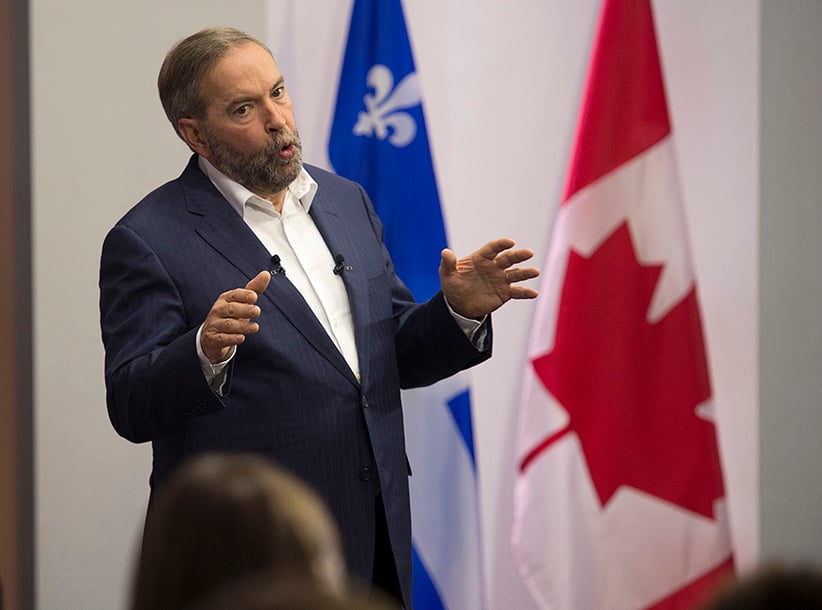Thomas Mulcair took a bold stand on the niqab. It may ruin him.
In the NDP’s power base of Quebec, Thomas Mulcair risked it all in condemning the Tories’ niqab gambit
NDP leader Tom Mulcair speaks to supporters during a visit to a dairy farm Saturday, October 3, 2015 in Upton, Que. (Ryan Remiorz/CP)
Share

In 2013, a visibly concerned Minister for Multiculturalism Jason Kenney chided the Parti Québécois for its so-called “Quebec values charter,” which would have prohibited Quebec’s public sector workers from wearing “conspicuous” religious accoutrements. Canadians, Kenney said, “have an equal right to participate in the public life of our society.” Kenney took to heart that the majority of Quebec MNAs were against such a thing, and promised that the PQ could expect a federal court challenge, should the charter become law.
Time and political circumstance, a cynic might suggest, have made a hypocrite of Kenney. Once put off by the PQ’s plan, Kenney and the Conservative government have essentially adopted the Parti Québécois strategy of demonizing certain religious symbols for electoral gain. Hence, the Conservatives’ sudden obsession with the niqab.
Kenney has apparently adopted the language of André Drouin, that country-bumpkin town councillor from Hérouxville, Que., who, in 2007, introduced a code of conduct outlawing religious face coverings, genital mutilation and the stoning of women. This code of conduct became a blueprint of sorts for the PQ’s values charter six years later—and its spirit lives on in Jason Kenney’s Twitter feed today.
“A Conservative govt will do more to help women & girls victimized by forced marriages, female genital mutaltation [sic]” Kenney tweeted on the day of last week’s debate. It came after a day of prolific Tweets from the minister, focused almost entirely on the niqab.
Related: The niqab election
For Stephen Harper’s Conservatives of 2015, the inference is practically identical to that of the Parti Québécois circa 2013: Religious types, Muslims especially, are taking over, therefore, their demands and practices must be constrained. And, as with the Parti Québécois, the Conservatives have made the issue of religious accommodation front and centre of their election plank.
Yet for the Conservatives, there is a potentially unhappy ending in how the PQ fared in the 2014 Quebec election. The party lost very badly, in large part because voters were mostly indifferent to the charter’s sound and fury. Given their respective statements during Friday night’s debate, it would seem Liberal Leader Justin Trudeau and, especially, NDP Leader Tom Mulcair, had this in mind.
“Mr. Harper, there are more anti-choice men in your cabinet than women who wear the niqab in Quebec,” Trudeau said with polished indignation. Mulcair, meanwhile, had the evening’s best reproach of the Prime Minister on the subject:
“The way Mr. Harper says it, it’s like there are people here that are pro-niqab. No one here is pro-niqab. We realize that we live in a society where we must have confidence in the authority of the tribunals, even if the practice is uncomfortable to us. If a journalist says something that is uncomfortable to me, I still support his right to say it. Mr. Harper, you are playing a dangerous game of the kind I’ve never seen in my life, and I never thought I’d see a Prime Minister play it.”
On the issue of the niqab, there is certainly more at stake for Mulcair than Trudeau. The NDP’s power base is in Quebec, where ire against all things religious is at its highest. As well, the NDP won most of its Quebec seats at the expense of the Bloc Québécois in 2011; retaining them in 2015 means placating scads of potential Bloc voters, who are generally more susceptible to the anti-niqab rhetoric. (Indeed, on the issue of the niqab, Harper and Bloc leader Gilles Duceppe are in virtual lockstep.)
It’s what made Mulcair’s frank condemnation of Harper’s niqab gambit so surprising.
In 2013, the NDP leader remained largely silent on the PQ’s values charter. While Trudeau was quick to denounce the PQ—“divisive identity politics,” he called it at the time—and Kenney was threatening legal action, Mulcair proceeded with caution, calling the proposed charter “a trial balloon.” “We don’t want to give ammunition to the separatists,” one of his advisers told me at the time.
Since the outset of the campaign, the NDP leader has been dogged with accusations of political pandering—of changing his message, depending on the audience. Yet, here he was in Quebec, his party’s base, and the province where anti-niqab sentiment is at its highest, saying exactly what much of his electorate doesn’t want to hear. Mulcair is nothing if not calculating, and perhaps he has calculated that the niqab isn’t nearly the electoral millstone some of his opponents hope it to be. That is a hell of a gamble. It is also an honourable one.